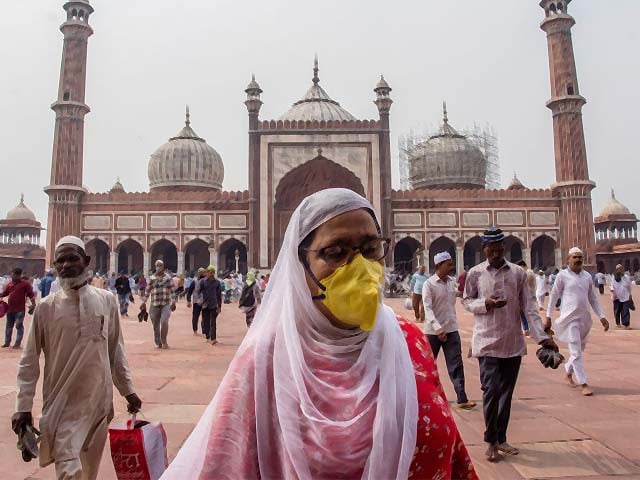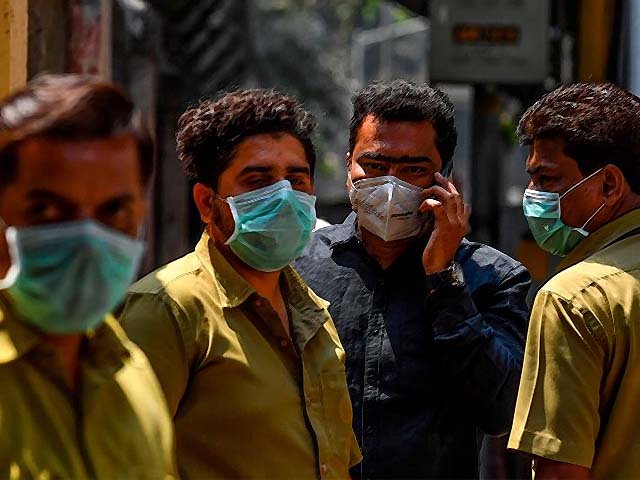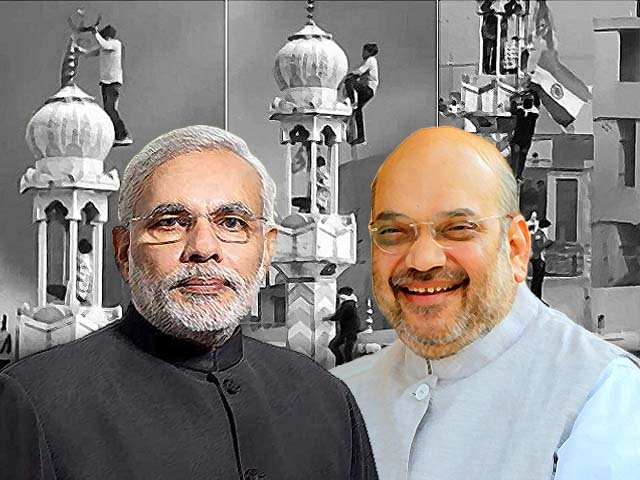
Anna Hazare's movement: An invitation to anarchy
Hazare appears to be a messiah - one who will bring deliverance from the corrupt bureaucratic system.
Amidst the din, noise, and clamour against corruption in India in the past week, there is a deafening silence - the silence of political class.
This is the first time democratic India is witnessing a popular televised revolt against the institutions of democracy, the inefficacy of the democratic system to deliver, and the ineptitude of the political class who are at the receiving end of the anger of the middle class din the country.
This revolt is being led by non-political players. A group of civil society members under the leadership of a veteran, anti-corruption crusader, Anna Hazare, have come together, with the leader claiming to be inspired by the Gandhian ways of life.
Seventy four year old Kisan Baburao Hazare (Anna is a local honorific for an older brother), a seventh standard pass out, has a history of serving in the Indian army as a driver. However, he took a premature retirement after providing 15 years of service. Before he joined the army as a driver, he sold flowers on the streets of Mumbai in the 1960s. Why Hazare left the army remains a mystery. However, the story goes that he suffered from depression after witnessing the deaths of his fellow comrades in the 1965 war against Pakistan. In this state, Hazre also, contemplated suicide. Finally he realized that social service was not his calling, and he took an early retirement.
A man of such humble origin, who is not highly educated, is the most popular leader of the educated middle class in India today. This is magic. He touched the hearts of the vocal section of the Indian people by raking up the issue of corruption in public life which has slowed down the growth of the country. The worldly, mobile, post liberalization middle class expects the same facilities and the same morality in conduct of the public servants which they see in the developed countries. The irony is that it is these same middle class citizens who are the real beneficiaries of institutional and corporate corruption.
There is one more facet of Hazare’s life, which I came to know the other day in a book release function in Delhi. One of the panelists pointed out that Anna once shared close proximity with Shiv Sena leader Bal Thackeray, a prominent Hindu right leader known for his macho image and very anti secular stand. However, somehow the friendship has soured over the years. Hazare is now close to Thackery’s disgruntled nephew, Raj Thackeray, who leads a new rightist party, Maharastra Navnirman Sena, which is notorious for indulging in violence against outsiders settled in Mumbai.
Despite the distance between Hazare and Thackeray, one thing remains common between their modes of agitation. Shiv Sena emerged as a party on the basis of anti-politics and anti-politician slogan, and it captured the imagination of the people. Today the modern Gandhian is targeting the whole political class; he talks about Jan Sansad (People’s parliament) debunking the standing of the Indian Parliament, and is not willing to trust the democratic procedure and processes.
An impatient new generation who sees corruption as an attack on India’s image, and as an impediment to the growth of the nation as a superpower, has little respect for such niceties. For them, the tumbling of number of corruption cases in the last two years, and the involvement of some cabinet ministers in these cases, is a symptom of the malaise this whole democratic process is suffering from. The middle class, who thrives on corruption, also sees it as a stumbling block in taking the country forward.
This is the reason they are not willing to listen to the inbuilt problems with the Jan Lokpal Bill (People’s Ombudsman Bill). Nationalist sentiment is so strong in them that they are not willing to see any reason as to why the brinkmanship that the civil society is indulging in is dangerous to liberal democracy, and established parliamentary institutions which have sustained the country thud far. Their frustration level is so high that Anna Hazare, to them, appears to be a messiah, who is going to bring them the much needed deliverance from the corrupt bureaucratic system.
The success of the movement also points to the political vacuum that the country is witnessing. The Congress leadership squandered an opportunity to take the country into confidence about their intent to counter institutional and political corruption. Even the main Opposition party, Bhartiya Jaanta Party (BJP) could not come up with any viable solution, as they themselves are knee deep in corruption in the states being run by them. Their credibility is also at an all-time low.
Therefore, the political void is being filled by the civil society leaders who, despite not being elected representatives, are dictating their terms to the government. The group imbued with the notion of self-righteousness, who tries to run down representative democracy, is not willing to address the institutional inequality, but wants to create a super institutional cop which will be stronger than the PM, who is directly elected by the people.
The solution seems to be more dangerous than the problem in itself.
Is it an invitation to anarchy or “grammar of anarchy”? Harsh Mander, a civil rights activist and a prominent face behind the landmark “Right to Information Act”, claims that “while corruption among judges, legislators and all the bureaucracy must be subjected to strong independent oversight, it is dangerous for democracy to concentrate this oversight in any single institution”.
A point also made by the writer, and activist, Arundhati Roy when she asks "does the solution to the problems faced by ordinary people lie in addressing the structural inequality, or in creating yet another power structure that people will have to defer to?"
However, at a time when the pitch is raised so high, that this agitation is being turned into a nationalist movement, full with patriotic symbolism, where any opposition to Anna and his associates’ blackmail is not tolerated, it becomes difficult to make people understand the folly of undermining the culture of democracy which has sustained them for more than sixty decades.
Still, questions need to be asked to those who are leading the movement; What vision and alternative are they going to provide if they run down parliament, its process and procedures?; Why create a crisis which leads to instability and disorder? Who is going to be the real beneficiary of this kind of nationalist overtone?
We have witnessed a similar kind of mobilization and incitement to the nationalist feeling in the 1980s, when the Hindu rights were trying to create an aggressive majoritarian nationalism in favour of a Ram temple in place of the Babri Masjid at Ayodhya. Even at this time, the nationalist sentiment of people was invoked. To build this temple, it was the duty of every Indian to contribute to this movement. A similar passion is stirring now.
It is no coincidence that the Rashtriya Swayamsevak Sangh (RSS), the Hindu right organization, is extending whole hearted support to the movement, and there is an overlap between the cadres and followers of India Against Corruption (IAC), the front of the civil society groups and the Youth Against Corruption(YAC).
There are people who vehemently deny such association. However, one thing is sure; this movement has captured the imagination of the people due to sustained media attention and support from various non-political organizations.
It’s the political leadership that has to handle this situation in a mature and enlightened way. They are responsible for this mess and they will, eventually, have to clean it up. They will have to assert themselves in the face of such strong arm tactics being employed by some people who believe that they are the true guardians of India.
By remaining silent they are giving credibility to a Gandhian suicide bomber who, inebriated by mass hysteria and the delusional belief of righting the destiny of the country, is hell bent on creating a crisis which will come down heavily on the same middle class who is at the forefront of this agitation.




COMMENTS (28)
Comments are moderated and generally will be posted if they are on-topic and not abusive.
For more information, please see our Comments FAQ